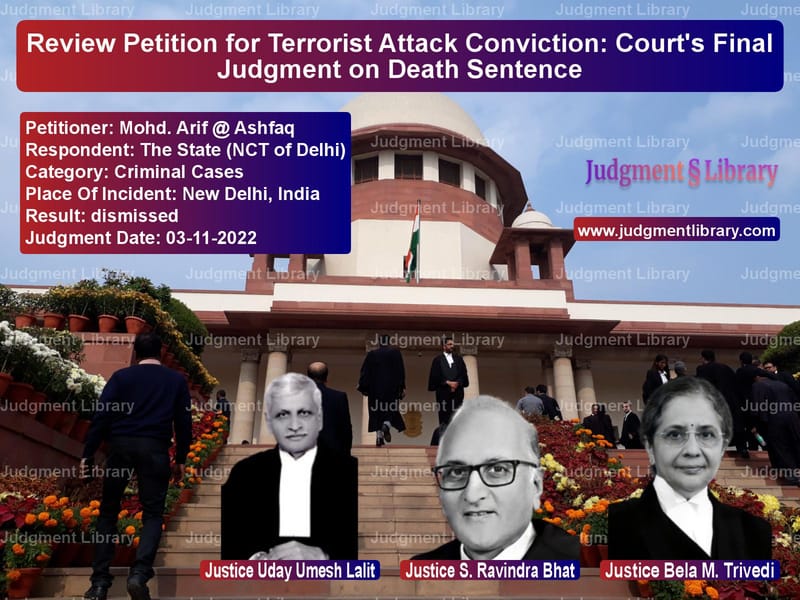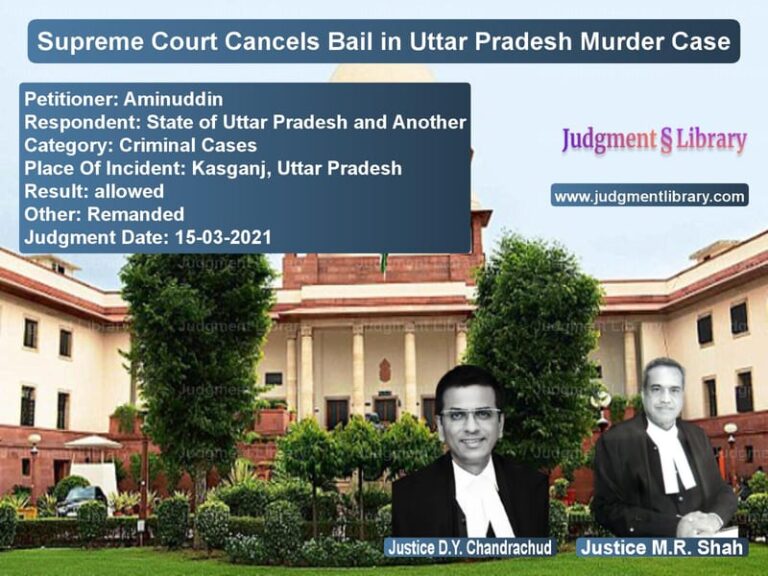Review Petition for Terrorist Attack Conviction: Court’s Final Judgment on Death Sentence
The Supreme Court of India delivered a significant judgment in the case of Mohd. Arif @ Ashfaq v. The State (NCT of Delhi), addressing the review petition filed by Mohd. Arif, who had been convicted for his involvement in the 2000 attack on the Indian Army’s unit inside the Red Fort, New Delhi. The appellant had been sentenced to death, and his conviction was upheld by the Court in 2011, but his review petitions and subsequent attempts for curative petitions sought to challenge the ruling.
Background of the Case
The case involves a deadly terrorist attack carried out on the night of December 22, 2000, when intruders entered the area of Lal Quila (Red Fort) where the 7th Rajputana Rifles of the Indian Army was stationed. The attack resulted in the death of three army jawans. The perpetrators, who later claimed responsibility as members of Lashkar-e-Toiba (LeT), escaped after firing indiscriminately from their assault rifles. The appellant, Mohd. Arif @ Ashfaq, was arrested and found in possession of materials related to the attack.
The Petitioner’s Arguments
In his review petition, Mohd. Arif’s counsel raised several grounds, including:
- Inadmissibility of Call Data Records (CDRs): The petitioner argued that the call records which were crucial in proving his involvement were inadmissible as they lacked proper certification under Section 65B of the Indian Evidence Act. The lack of a valid certificate made these records unreliable and violated procedural requirements.
- Improper Custodial Treatment: The petitioner contended that his confession to the police, which led to critical evidence being found at various locations, was coerced under duress during his custody, and thus, should be considered inadmissible.
- Falsity of Disclosure Statements: The defense submitted that the recovery of firearms and ammunition in Batla House during a police encounter could not be directly linked to the petitioner’s disclosure statement.
- Possibility of Rehabilitation: The defense argued that there was a possibility of rehabilitation and reformation, particularly given the appellant’s relatively young age at the time of the incident and the passage of time since his arrest.
The Respondent’s Arguments
The State of Delhi responded by emphasizing the seriousness of the crime, asserting that:
- Admissibility of CDRs: The State maintained that despite the lack of Section 65B certification, the CDRs were admissible as they were obtained through proper channels and were key in establishing the timeline of events and the appellant’s involvement in the attack.
- Coerced Confession: The State argued that the confession made by the appellant was voluntarily given and led to the discovery of important evidence, which supported the charge of terrorism and waging war against the nation.
- Role in Terrorism: The State contended that the appellant’s actions were not merely criminal but were part of a larger terrorist conspiracy, aimed at destabilizing India’s sovereignty and endangering national security.
- Mitigation of Sentence: The State emphasized that in cases involving acts of terrorism and attacks on India’s sovereignty, there were no mitigating circumstances that would reduce the severity of the crime, thus justifying the death penalty.
Supreme Court’s Observations
The Supreme Court reviewed the arguments and the evidence presented in the case and made the following observations:
- On the Admissibility of CDRs: The Court noted that the CDRs were integral to establishing the connection between the appellant and the crime. However, it was acknowledged that the proper certification under Section 65B of the Indian Evidence Act had not been provided. Despite this, the Court held that the failure to produce the certificate did not automatically render the CDRs inadmissible, as the Court could still rely on secondary evidence under Section 63 and 65 of the Evidence Act, based on the facts of the case.
- On the Confession: The Court held that the appellant’s confession was not coerced, as it had led to the discovery of significant evidence, including weapons and explosives. The Court ruled that the confession was admissible and relevant to the case.
- On the Issue of Terrorism: The Court observed that the attack on the Red Fort was not only an attack on the military but also on the national heritage and sovereignty of India. The Court held that acts of terrorism, especially when they involve foreign nationals and are aimed at waging war against the Government of India, warranted the most severe punishment.
- On Mitigation: The Court found no mitigating circumstances that could reduce the severity of the sentence. The appellant had participated in a terrorist conspiracy that involved premeditated violence and a direct assault on India’s sovereignty.
Supreme Court’s Verdict
After considering the facts, evidence, and legal arguments, the Supreme Court ruled as follows:
- Review Petition Denied: The Court dismissed the review petition, upholding the appellant’s conviction and death sentence. The Court concluded that the crime committed was one of the “rarest of rare” cases, warranting the highest punishment.
- On the Admissibility of CDRs: The Court clarified that, despite the procedural issues with the CDRs, the other evidence presented in the case was sufficient to establish the appellant’s involvement in the attack.
- Final Decision: The death sentence imposed on the appellant was upheld, as the nature of the crime, the involvement of foreign nationals, and the impact on national security made it a case that fell within the “rarest of rare” category.
Key Takeaways from the Judgment
- Admissibility of Electronic Evidence: The case highlights the importance of adhering to Section 65B of the Indian Evidence Act for the admissibility of electronic records like CDRs. However, it also demonstrates the Court’s flexibility in considering secondary evidence when primary evidence is unavailable or incomplete.
- Importance of Circumstantial Evidence: The case reaffirms that circumstantial evidence, when properly established, can form the basis for a conviction in terrorism-related cases.
- Death Sentence in Terrorism Cases: The judgment reinforces the principle that in cases involving terrorism and attacks on India’s sovereignty, the death penalty may be warranted, especially when the crime is premeditated and heinous.
- No Mitigation in Terrorism Cases: The case sets a precedent for the lack of mitigating circumstances in terrorism cases, where the severity of the crime outweighs any factors that might suggest rehabilitation.
Implications of the Judgment
The judgment has significant implications for criminal law, especially in terrorism-related cases:
- It strengthens the position that terrorism-related offenses are among the most severe, warranting the death penalty in the rarest of rare cases.
- It clarifies the approach to circumstantial evidence and the admissibility of electronic records, which is critical in the modern age of digital communication.
- The case emphasizes the need for a robust legal framework to handle terrorism-related offenses, balancing the rights of the accused with the need to protect national security.
Conclusion
The Supreme Court’s decision in Mohd. Arif @ Ashfaq v. The State (NCT of Delhi) highlights the importance of the death penalty in cases involving terrorism and attacks on India’s sovereignty. By dismissing the review petition and upholding the death sentence, the Court sent a strong message about the severity of such crimes and the need for strict punishment. The case also underscores the evolving nature of electronic evidence and its role in modern criminal investigations.
Petitioner Name: Mohd. Arif @ Ashfaq.Respondent Name: The State (NCT of Delhi).Judgment By: Justice Uday Umesh Lalit, Justice S. Ravindra Bhat, Justice Bela M. Trivedi.Place Of Incident: New Delhi, India.Judgment Date: 03-11-2022.
Don’t miss out on the full details! Download the complete judgment in PDF format below and gain valuable insights instantly!
Download Judgment: mohd.-arif-@-ashfaq-vs-the-state-(nct-of-de-supreme-court-of-india-judgment-dated-03-11-2022.pdf
Directly Download Judgment: Directly download this Judgment
See all petitions in Bail and Anticipatory Bail
See all petitions in Terrorist Activities
See all petitions in Custodial Deaths and Police Misconduct
See all petitions in Judgment by Uday Umesh Lalit
See all petitions in Judgment by S Ravindra Bhat
See all petitions in Judgment by Bela M. Trivedi
See all petitions in dismissed
See all petitions in supreme court of India judgments November 2022
See all petitions in 2022 judgments
See all posts in Criminal Cases Category
See all allowed petitions in Criminal Cases Category
See all Dismissed petitions in Criminal Cases Category
See all partially allowed petitions in Criminal Cases Category







